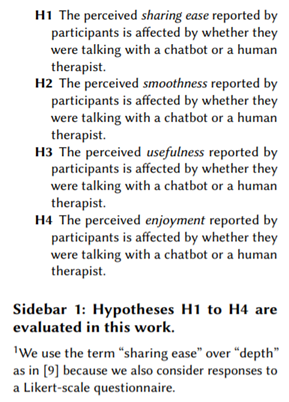
Mental illness is a leading contributor to the global health burden. Access to treatment often entails long wait lists, high cost, and logistical difficulties. Several promising studies have demonstrated clinical efficacy of internet-based CBT, whereby the need for a face-to-face presence is negated.
This study aims to assess the potential for chatbot therapists as a mechanism to reduce cost, increase access to treatment, and overcome the practitioner bottleneck. While clinical efficacy is critical for such therapists there are other factors that contribute to a good therapy session. In this work, we focus on four metrics of session perception, leaving clinical efficacy for future study.